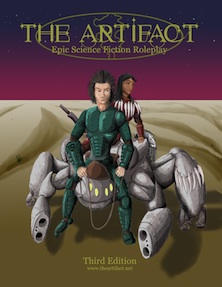Part 2 of a two part series on giving tips to the players. If you haven’t already read How To Be A Good Roleplayer then please go back and read it. I’ll be building on what was written there because you have to be good before you can be great right? I’ll wait for you.
This article is longer than the last. The concepts are more difficult to convey. If you’re ok with being a “Good” roleplayer, turn back now because these tips could change the game for you completely if you implement them.
Immersion
This step is intuitive. Immerse yourself in the story. Immerse yourself in your character. That seems fairly basic, but is it really? How do you really put yourself in character? Do you know who your character is? Sure an elaborate backstory is fine but can you leverage it into what’s happening now without resorting to a flashback or trying to munchkin in some advantage for the character?
There’s a saying that goes “Being powerful is like being a lady. If you have to tell people you are, you’re not.” You could slip in being in character to that saying. If you have to tell people that you’re acting in character, then you’re not.
Sometimes adding a unique accent to a character can help put yourself in the mood of the character but it’s not a crutch that you want to rely on every time. It’s better to have a unique goal or philosophy for a character. One that informs you of the character’s core motivations. Sure there are the standard tropes of a driven, angry warrior seeking revenge but those get old fast. What about a character that’s depressed but is driven by duty? That can be a rich character to portray.
Beyond just amassing power, does the character have a goal? Is all this skill and resources for something other than the obvious? Is there that special someone who the character is trying to impress? Is there a need that the character is trying to fulfill? Does your GM know your goal? Does your GM know what aspects of that goal you want to explore and which parts you don’t want to be touched? For example, my character is trying to prove that he’s a real man to impress the girl he’s always pined over. I’d like to explore if my character’s approach would ever really be impressive to her but I don’t want her showing up as an evil villain at any point.
Summarize your character’s outlook on life in a simple sentence. Immerse yourself in who you see the character to be. Write it down. Now try to imagine the strongest aspects of that outlook. The things that when distorted to an extreme degree would make this character unique. Maybe you want the outlook to be functional but could you make an outlook that makes sense to the player but seems contradictory to others? Could you make an outlook that’s touching?
Most of all don’t immerse yourself in an annoying character. Players that try to make a funny character but that do it at the expense of other PCs are not going to get any laughs. Characters that stop the story from moving forward because of what the player sees as opposing how the character would act or stopping others from moving the story forward are not going to be well liked. Worse, they end up as the opposite of interesting because they stall the game. Yes the character may hate something or someone but how could they find themselves in a situation where they have to live with the situation they’re in? How could they be forced to accept the situation?
Learning The Language of Improv
When telling a story with others as its unfurling in a game has many similarities to improvisational theater. Some games build improv concepts into them to help the GM and players understand where they can be applied to game play. It should be acknowledged that RPGs are not about acting, it can help if players dip their toe in acting but that’s not what most role players are around the table to do. Improv isn’t just about acting either though.
Improvisation is about using what’s available and making something out of it. It often includes concepts of how to take something you’re given by someone else, something you may not have looked for or even wanted and still building with it.
Sometimes the materials that we’re given by our collaborators can head away from the place we wanted to go. To tell what appears to be a coherent story from choices that have already been made we have to be willing to work with what we’re given and not stop the process to complain. The show must go on. Or does it?
It’s true that most of us don’t play our games in front of an audience like improv actors or comedians. We are our own audience though and making a game enjoyable means that continuing the story is just as important for players as it is for a crowd.
One of the tenants of improv is, say yes. Saying no to what another actor or in this case player has just said they wanted stops the story. Saying yes allows it to continue, it allows something to be built. Saying “Yes and” continues what the last player said and adds to it. Saying “Yes but” is contradicting what the last person said and can interrupt the flow of the story even if it’s slight.
Now the player that needs to say “Yes”, “Yes and” and may need to say “Yes but” the most is the GM. Are you giving the GM something they can say yes to? Are you giving the other players something they know what to do with?
To improv requires that people put away their egos and not think of contributions as “yours” and “mine”. Each contribution is simply the next step in the story.
For more, listen to someone who actually knows what they’re talking about explain improv.
It’s About Story
I keep saying “the story” because a game, and especially role playing games are about story. Football games are about the story, who played, who won and how. Monopoly is about the story, who played, who won and how. Role playing games are really all about story.
If you’ve played RPGs for any length of time, you have some quote, situation or concept that you and your group at the table bring up at times and everyone laughs. Everyone that played that game that is. That’s significant for a game because it’s a shared experience.
A story is, at it’s core, a shared experience. When you read a book, you share the experience of that story with everyone that has ever read that book. When you watch a movie or listen to a song, you can refer to the experience that story carries with anyone who has shared it. It is a mental point where people can convey complex concepts to each other, often with only a few words. It’s also an emotional link that can be very powerful.
RPGs are unusual in that they produce a story experience but usually only those that play will ever share it. It’s like a movie that only you and your group of players will ever know. An exclusive club where only the players are allowed access.
In the end, the shared experience is why we play.
It’s not about experience points or treasure. It’s about sharing the story. It’s about the mental bond that forms between people. When a player understands that, they transcend the barriers of their own desires and start to explore experiences that can be shared with their table mates. They stop worrying if their character will fail, will die, will strike it rich. As long as those things tell an interesting story, they’re happy.
Know Your Game
Lastly, knowing the game you’re playing is important. Although people tend to think of rules as limiting, the rules of an RPG can also give a player authority to accomplish the things they want to do.
For instance, “Bang you’re dead!”, “No I’m not!”. No one has authority to say who’s right unless there’s a rule that effectively arbitrates the conflict between players.
A player that knows the rules of the game can envision what is needed to tell the story they want to tell. A player that doesn’t know the rules, has to rely on other players to allow them to do the things they want by spoon feeding them the rules.
If you played a game of chess without knowing the rules but you played the moves a grand champion told you to make, in the end when you checkmate your opponent, did you win or did the grand champion? Relying on others to feed you the rules means that you’re not playing to your potential.
Rules are tools to tell a story. They’re also the story’s validation. Anyone can sit down with a few friends and make up a story together if they want to. They don’t need rules. However nothing stops them from telling the wildest most unbelievable story imaginable. There is no accomplishment in the story itself. A game challenges the player to accomplish and through that challenge comes validation that the player actually accomplished something.
Comments?
After nearly thirty years of RPGs I’m still learning. These are the things that I try to do when I play. Is there something that you do? Some bit of insight that has made your play transcend what it once was?











 The Free RPG Blog
The Free RPG Blog